A place to catalogue how I practice. Use the search function to navigate my 4 quads :) Knowledge Skills Ethics & values Use of self Also search theory for all things theory-based
Don't wanna be here? Send us removal request.
Text
Welcome!
In hopes of chronicalling my development as a social worker, returning to my roots is the best start. At my core, I am still a 14-year-old girl in high school with a few friends and too much free time to spend/waste watching shows and being online. Now, that girl has homework.
For thoughtful practice, I need to figure out how exactly I want to practice. This will require me to pie-chart my brain and my way of thinking into quads:
Knowledge. Know your theories and know them well. Strengths-based, trauma-informed, systems, etc. But don't just know them, learn how to see them. Understand them. Flex them like a muscle.
Skills. What do I have to offer, and what do they look like at a micro level? Is simply being able to talk to someone really a skill?
Ethics and values. Personal and professional.
Use of self. Who am I, and how do I interact with my work? How do I show up? Am I emotionally intelligent? Do I know myself? Does anyone really know themselves? Time to crack the code.
It's a place to start. For organization, I will use the tags #knowledge #skills #ethics&values and #useofself to categorize my posts into these four realms. I will also explore prominent theories in social work practice, particularly when working at a micro level with individuals and families.
0 notes
Text
Media Analysis: Individuals & Family Social Work In Movies/TV
When learning about social work practice, a helpful method of learning is to step outside textbooks and academic journals and engage with case studies. Having a client biography, presenting situation, and the reason for seeking care allows students to practice using theory and skills in how they would approach them.
However... It's also nice to take a step further away from academia and put on a movie or TV show that has social work practice. So here's my list of favourite examples of individual and family social work practice depicted in media. I am also going to include individuals or families who may have benefited from having social work support.
Lilo and Stitch
Even though it's a movie that I would more associate with aliens and a little girl bonding with a creature who she sees as the answer to her prayers, the background plot is her sister proving to an observing social worker that she is fit to take care of her younger sister following their parent's passing. It depicts child protection and the anxiety of trying to keep a family unit together underder traumatic circumstances. Ohana means family, and family means no one gets left behind or forgotten.

Beautiful Boy
Based on a novel (and a true story), this film follows the journey of a family confronting their eldest son's struggle with addiction and remaining sober. What makes this movie a strong example of family social work is the intersecting factors represented in the family unit: a divorced couple who live in different cities having joint custody over their son, a father who remarried and has children with their new partner, scholarly pressure... The movie does not show social workers explicitly, but potential resources they may refer to: detox centres, AA meetings, and family support groups.
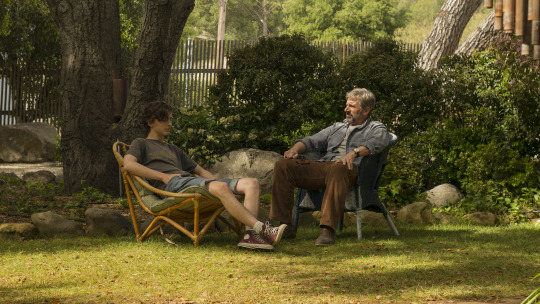
The Florida Project
Sean Baker was recently awarded the Oscar for best director for his film Anora, a modern-day Pretty Woman. His muse is the world of sex work, with his films following the lives of street sex workers, dancers, and escorts. What makes The Florida Project unique from his catalogue is that it is from the perspective of a 6-year-old girl, Moonee, and her friends. They live in a motel with their mothers who used to or still work in the industry. The audience sees Moonee's mother struggle to make ends meet for the two of them, as she is a now out-of-work stripper. The mothers in the movie are threatened with calls to the Department of Children and Family because of their work, and they navigate systems of oppression to keep their little families together. If we were to use the movie as a case study thought experiment, what makes it unique is that it forces us to consider the situation from the child's perspective. What unique skills would we employ when speaking to a child versus a parent? How do we navigate procedures while keeping in mind vulnerability?

Some honorable mentions include..
The Bear (tv). Includes themes of substance misuse, suicide, addiction, and family system disruption.
The Sopranos (tv). Primarily a show about the Italian mob, but it has a very famous side plot of the lead character seeing a therapist.
It's Kind of a Funny Story (movie). Another personal favourite of mine, follows a teenager who admits himself into the hospital due to suicidal ideation. I think it's a good example of looking at clinical care.
0 notes
Text
When you're working with a client and you think you know what's best for them...
Shrinking is fantastic and shows different kinds of counselling styles. It also shows what can happen when the counsellor inserts themselves a bit too much in the lives of their clients.




SHRINKING 1x01
107 notes
·
View notes
Text
Code of Ethics
In most service-providing fields, a Code of Ethics is implemented as a way to base practice. It helps eliminate biased practice and reach a level of uniformity amongst practitioners.
Written and reviewed by the Canadian Association of Social Workers, the Code of Ethics outlines 7 professional values social workers must uphold for ethical practice:
Respecting the dignity and worth of all people
Promoting social justice
Pursuing Truth and Reconciliation
Valuing human relationships
Preserving integrity in professional practice
Maintaining privacy and confidentiality
Providing competent professional services
They are offered as guiding principles when developing individual practice. However, it isn't a "you're good to follow 5/7" approach. We cannot be completely divorced from valuing human relationships in contrast to really working on promoting social justice; one cannot exist without the other.
A value in the Code of Ethics that I feel I bring into my personal life is respecting the dignity and worth of all people. Asking for help with a vulnerable action for someone to take, particularly in the case of service users. What I keep in mind for this value particularly is that, even though someone may have come to me asking for help, that does not mean I get to make their decisions or that I know what's "best" for them. Maintaining autonomy lets folks keep their dignity, as they are still the experts of their own life.
1 note
·
View note
Text
Family Practice: Little Miss Sunshine
Disclaimer: This is a very self-indulgent example on my part. As one of my favourite movies of all time, I take any opportunity to talk about LMS. And, as it happens, it's a great example of how different systems look within a family unit and how other people may respond to traumatic experiences. Multiple generations living within the same household, suicide, marital conflict, a teenager going through a bit of an identity crisis, and so much more.
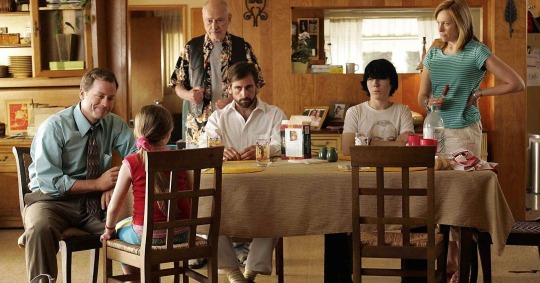
From a family systems perspective, the disruption of the nuclear family is at play. At a point in time, the family unit was composed of the mother (Sheryl), father (Richard), son (Dwayne) and daughter (Olive). They played their own role in slightly disrupted ways. We find out that Sheryl is the primary income earner, as Richard pursues a... unique career as a motivational speaker. Dwayne and Olive have a considerable age gap, possibly implying she was not planned. Dwayne is at the stage of identity formation, taking extreme steps to show his dedication to his future by taking a vow of silence until he reaches his goal of joining the flight academy.
Off screen, their family system becomes disrupted when Richard's father, Edwin, moves in with them. In some cultures, it is expected that older parents move in with their children; however, the audience can easily tell this is not the case. It creates a "sandwich generation" relationship, as Richard now has to provide for his own family as well as his father. This becomes a source of embarrassment, as Richard is barely providing for his family, if not for his wife.
The catalyst for further disruption occurs at the beginning of the movie, where we see Sheryl pick up with brother, Frank, from the hospital. He has recently attempted suicide and requires 24/7 monitoring, and Sheryl invited him to live with her family.
This movie offers many thought experiments throughout its runtime, as we see characters navigate their own disruptions as well as their interactions with each other. For example, we can recognize Richard's complete lack in TIC as he skirts around the topic of Frank's suicide attempt, going as far as calling him a loser when Olive asks why he did it. Sheryl and Richard would benefit from a type of couple's support, as we see them having a blow-out fight over income and impending divorce. Edwin is misusing heroin, and Dwayne has a complete identity crisis when he learns he is colour blind.
If not evident by now, I could do a full character study on each of these characters. I feel as though individual counselling would be the best course of action before family counselling (if they were to reach out for social work support), with the admission of Olive, who is still quite young. Taking a family systems approach may be revealing in understanding where each member sees themselves within the unit and how outside expectations around occupation, income, and gender roles influence their decisions.
0 notes
Text
Scholar Profile: Jill Levenson and Trauma-Informed Care
A pioneer in trauma-informed care within social work, Levenson is a certified instructor on trauma-informed practice and how to provide care in different contexts. Her work focuses on sexual violence and research into prevention, perpetration, and resulting trauma.
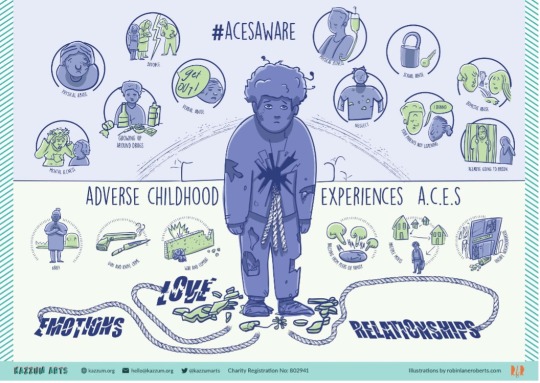
Through her research, she found that adverse childhood experiences (ACE) are a key contributor to future trauma responses and PTSD in adulthood. Therefore, to practice TIC, workers have to look into the history of their clients to properly understand their presenting situation and concerns. It is easy to default to reactionary practice, looking only at why a client was referred or sought out care. However, we must shift toward preventative care, minimizing or eliminating the potential for ACEs.
In my micro practice with individuals, properly educating myself on historical traumas for clients will be a focus of mine as I continue studying. Historical trauma refers to experiences that may be generational, affecting individuals even though they did not experience the trauma first-hand. For example, this kind of trauma can be seen in survivors of residential schools or war.
0 notes
Text
Ethics and Values
I genuinely don't know why this has always been a harder sphere for me to delve into! Don't I know what my values are? What ethical dilemmas do I find more or less difficult? That's a good place to start: familiar ethical dilemmas.
It feels important to listen to this while trying to make your ethical decision.
The classic is the trolley experiment. It is so well known at this point that Mr. Beast included it in his Amazon show, "The Beast Games." One track has one of the most important people in your life (partner, friend, child), and the other has 5 strangers. Do you move the train, intentionally saving your person and killing the strangers, or let the train continue on the track, as objectively 5 lives are worth more than 1. I have decided to leave my answer not attached to my digital footprint.
In complete seriousness, the field of social work is composed of ethical dilemmas, some big, some small. It contributes to burnout or compassion fatigue, having to make all these micro decisions that may determine whether someone is housed tonight or not, or who out of a group of 20 will receive a spot in treatment.
At a micro level, working with individuals and families, an ethical dilemma I fear is what to do when someone discloses with me something I must report per the Code of Ethics. The dilemma becomes my professional obligation to report and break confidentiality or risk having my license being revoked to protect the client. I want to be greater, more powerful than the law! But of course that is why we don't work in solidarity, but in a team. Alternative responses, support, and not having to make all the decisions on your own make the work feel a little less daunting
0 notes
Text
youtube
Skills: Counselling
Social work is all about developing our soft skills. Even if "counsellor" isn't the end goal, the skills used by counsellors are important to have in your tool kit. Active listening (nodding, eye contact, mirroring body language) can help build trust and create an environment where a client feels more comfortable opening up.
UBC's School of Social Work has a free catalogue of instructional videos showing different skills in practice settings. It's a great resource when first learning foundational skills such as paraphrasing, summarizing, and different empathic statements.
At a micro level, these resources help me develop the ways I will practice. I find it beneficial to see examples of counselling skills, such as tone of voice, how ideas are framed, and body language. As a future social worker, I see developing my interpersonal skills as similar to developing a voice when writing. The way I counsel individuals and families will look different to my colleagues as I pull from my own experiences and skills.
0 notes
Text
Theory: Individual Development Theory
I am drawn to theories relating to family dynamics, as I intend to eventually work in youth and family practice. Developmental theories feel like borderline personality tests, with attachment theory being highlighted in any 100-level Psychology course. Do you have difficulty forming healthy platonic and/or romantic relationships? Anxious attachment.
Similar to the personality test vibe is Erikson's Individual Development Theory.
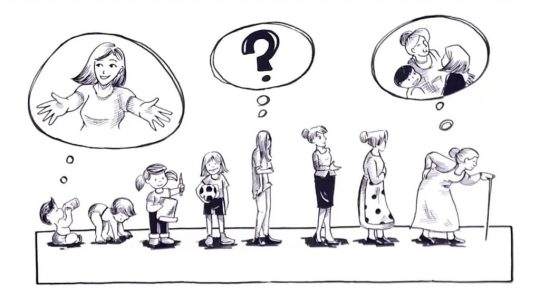
image credit: Jonas Koblin (SproutsSchool)
The tldr of the theory is that the individual life experience is broken down into 8 stages (with a bonus 9th) with stops every few years to overcome. Think of playing the boardgame Life. Do you choose to go down the path of marriage or detour and complete college first? Erikson poses that each of these stages marks a significant stage in development that we either overcome or, well, don't. Using the comparison of attachment theory, the first step we must "overcome" is the crisis of trust vs. distrust at around 0-2 years old. The vulnerability experienced in infancy demands a level of trust from caretakers, and when that trust is broken or unfulfilled, we may find it difficult to trust in the future.
For myself, I can't decide whether I enjoy or fear the stage Erikson has placed me in - Stage 6: Intimacy vs. Isolation. I personally still feel stuck in stage 5: identity vs. identity crisis
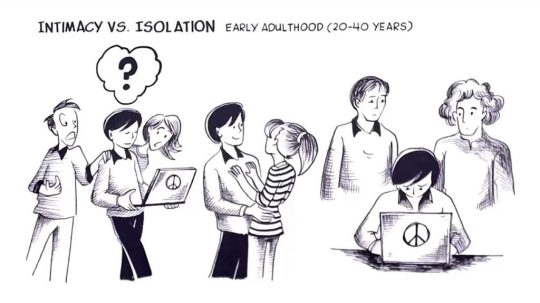
image credit: Jonas Koblin (SproutsSchool)
Here, fellow stage 6ers are meant to have an idea of who we are, what we want in relationships, and an idea of what our future occupation will look like. Having mastered identity, step 6 features finding life partners and jobs that last a lifetime. And if you don't? Isolation follows... doesn't intimacy have a better ring?
No theory is without its critiques, and I have words for Erikson's step 6. Labeling success in early adulthood as finding your forever job and a person to marry and start a family with is heteronormative, capitalistic, and pretty boring. I argue that 20s have now become a continuation of identity formation and that putting a timeframe on deciding "who you are" limits those from meeting their full, dynamic potential. Also! Cultural ties may contribute to how individuals find their partners or if they prioritize establishing their careers first. Sexuality, gender expression, and the desire to even have companionship or a family further complicate young adulthood.
All of that to say, there is merit to learning the Individual Development Theory. It can be helpful when trying to understand a person's reactions or decisions by placing their timeline along Erikson's. For example, we may learn from our client that they did not have many opportunities to socialize during elementary school. Aligning with stage 4: industry vs inferiority, we may understand why they seem overly negative toward themselves. Or it may be something completely different! That's up to us as social workers to critique.
0 notes
Text
re: Self-Care
A project I am currently doing when I need to practice some self-care is knitting this hat. This is a free pattern, and it doesn't take very much yarn and is great for beginners! I am making different fruits for my friends... a strawberry first
0 notes
Text
How To: Self-Care
When I returned to school, a new concept had been introduced: self-care. From context clues, I could guess what this referred to: taking care of ourselves. It was in the syllabus, on slides, and whole classes were dedicated to teaching self-care. Where was this when I was wrapping up my first undergrad, sleeping at 4 a.m., and eating nachos for dinner? I guess I can say that was its own form of "self-care."
Now, two years back in the game, I can speak on the importance of self-care and why it shouldn't be demoted to a buzzword bandaid. Especially within social work, taking meaningful time to check in with yourself is important for practice. The field requires professionals to place themselves in emotionally elevated environments as they walk alongside their clients. Burnout and compassion fatigue are potential symptoms and a reason why self-care needs to be part of practice.
It is also important to note to be critical of how self-care is taught. Depending on the setting, self-care can be put into a neoliberal context, framing it as a way to ensure you will always be just at capacity to be professionally productive. However, self-care is more than making sure you can come into work tomorrow. Holistic practice encourages us to consider our spiritual health, which can go beyond religious ties.
Definitions:
Burnout (n): being emotionally, physically, spiritually, and/or mentally exhausted as a result of being exposed to prolonged stress.
Compassion fatigue (n): being exhausted as a result of being constantly around others in heightened emotional states, traumatic environments, and/or stressful situations.
For me, self-care looks like a whole bunch of things! A non-expansive list...
RNGing a movie from my watch list (or putting on an old favourite)
Going for a walk the length of my current favourite album
Seeing a movie/calling/going out for dinner with a friend/friends
Knitting with my mom
A long shower
Spending extra time on my hair and/or eye makeup in the morning
...and nachos for dinner. Because some things never change.
A question for you all: What do you do to practice self-care?
0 notes
Text
“Respect yourself enough to walk away from anything that no longer serves you, grows you, or makes you happy.”
— Robert Tew
3K notes
·
View notes
Text
how I feel returning to Tumblr on the 14th birthday of my OG account

Computer Chronicles - Windows 95
814 notes
·
View notes
